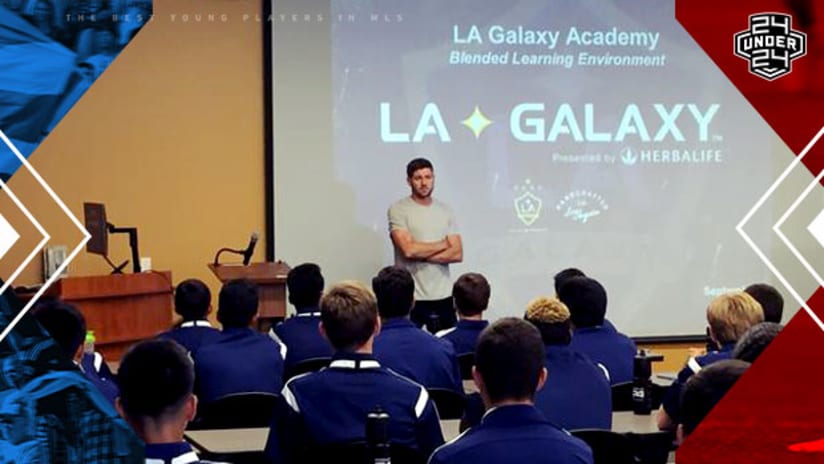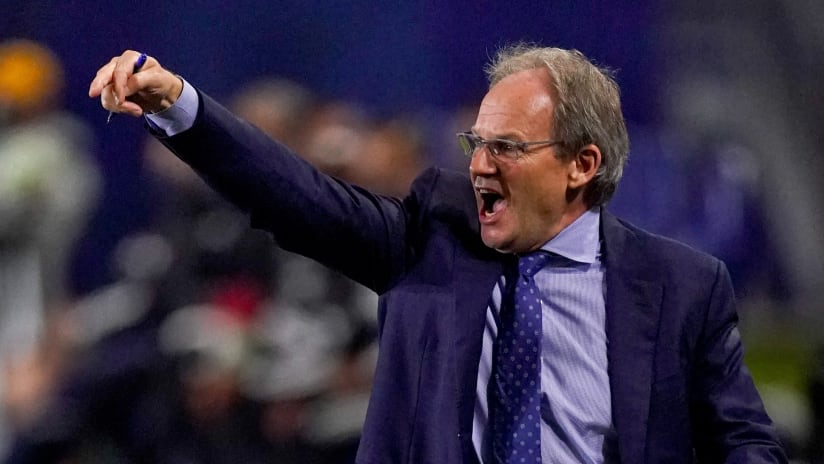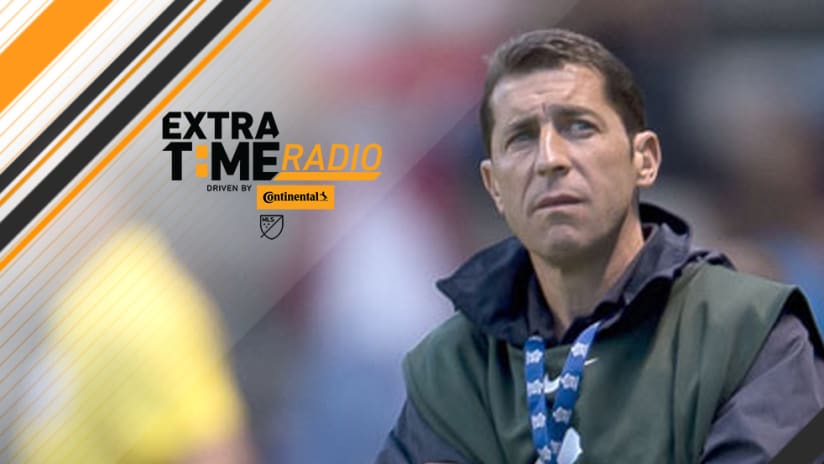CARSON, Calif. – As the LA Galaxy have constructed something of an MLS dynasty behind the country's most storied coach and a lengthening list of big-name talent, work of greater importance has been going on away from the spotlight.
The Galaxy are building toward tomorrow, and the day after that, using a blueprint that’s based on some of the planet's most successful clubs while putting their own imprint on the process. It's all about producing talent, a pipeline of players from the club's academy to the first team.
But it's more than that, and LA are aggressively moving forward.
They've just opened a school for their top under-16 and -18 players, who now spend nine hours a day on the campus of Cal State Dominguez Hills, where resides the club's StubHub Center headquarters.
They continue to sign Homegrown talent for the first team and the Galaxy II reserves, 15 in all with more to come. And they've sharpened their search for Southern California's best players – and at increasingly younger ages.
It's all part of a greater initiative, to embed the Galaxy and all it represents deep into the fabric of their community. They want to be to Los Angeles and its environs what, say, FC Barcelona is to Catalonia.
It'll take time. Winning is the starting point. Finding the fuel to win is vital.
“Our goal,” says technical director Jovan Kirovski, a former Galaxy forward, “is to have eight to 10 first-teamers from our academy. And then we'll sprinkle in the big superstars. Imagine what that would look like.”
*
They've done a fairly decent job so far, with US national teamer Gyasi Zardes among six first-team Homegrown players, but all six are "hybrids" in a manner of speaking, with the Galaxy academy more of a finishing school for them rather than a cradle-to-grave identity.
It’s a good start, but things are changing under Pete Vagenas' leadership.
“Our academy is relatively young,” explains club president Chris Klein, a former LA and USMNT midfielder. “In the early days of an academy, the structure is very important, and in some sense you are recruiting rather than developing. And we always had an understanding of that, and we've reaped the benefits of that.
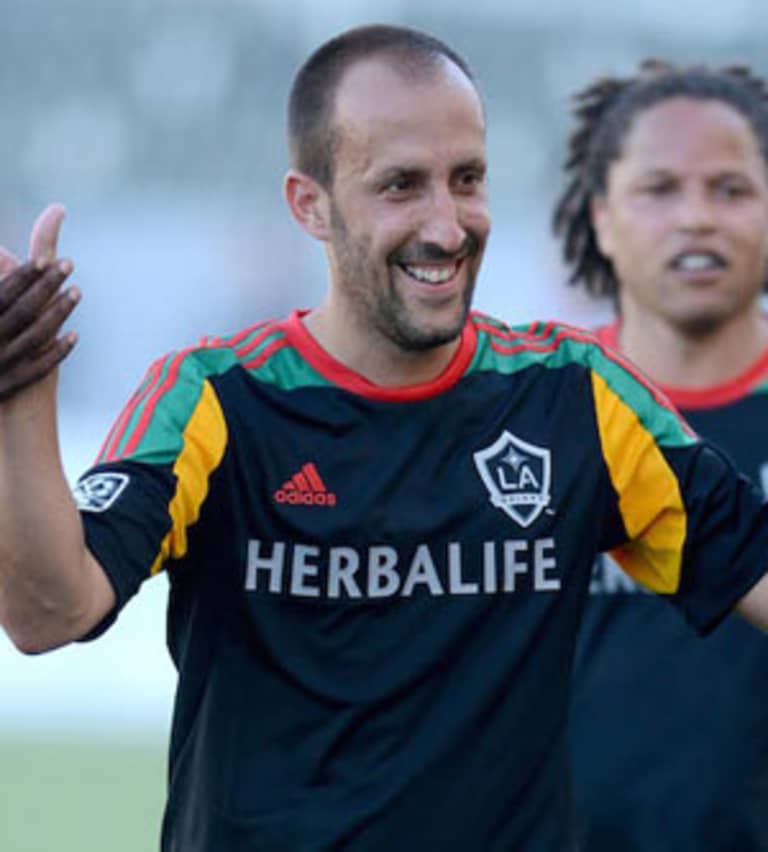
Former MLS midfielder and captain of the US Olympic team in 2000, Pete Vagenas, now runs the LA Galaxy Academy.
“What Pete has done is continue to really transform us so we can develop players that have the mark of an LA Galaxy player.”
Vagenas, who captained LA to the 2005 MLS Cup title, was brought on as academy director in June 2013, and he's overseen expansion of the system, with teams to the U-12 level and through four affiliate clubs as young as U-8. He's brought in a few top youth coaches – luring first Mike Muñoz and now Brian Kleiban from Chivas USA's now-dormant academy and pulling Michael Quigley from the club's South Bay affiliate to be the academy U-12 coach, a key post – broadening the club's scouting capabilities in the process.
The aim is to identify and acquire every top player in Southern California. All of them, within reason.
“We understand that where we are, in Southern California, we have the best talent [in the country]. We need to take advantage of that,” Kirovski says. “We want to make sure that each and every kid within our region, we have first dibs on them.”
They're doing a better job of accomplishing that all the time.
“Kids see our club, they want to be here,” he continues. “They know that if they come here, they have a real chance. There's a real environment. They realize the difference between the club teams and a professional team. We've now changed [that equation], and it will get even bigger, where they're going to say, 'I want to be there, I need to be there.' And it's starting to get there.”
Scouting is key, and the Galaxy are building a network of contacts across the region. The coaches watch as much local soccer as possible – “Nonstop, 24 hours,” as Muñoz puts it – and although there are players that inevitably will fall through the cracks, Vagenas & Co. believe that they know every top player in the area. Or soon will.
If LA has gone after older talent in the past, they're now focusing on younger players, whom they can groom throughout development into “Galaxy” players.
“We're open to talent across the boards,” says the Pasadena native who starred at UCLA and helped lead the US to a fourth-place finish in the 2000 Olympics before joining the Galaxy. “It is very difficult at this point, but not impossible, to join our academy later in your development, so the best realistic chance to get in is with the younger ages. ...
“That being said, it's impossible to identify and locate every top kid, and we do see kids join our academy later, and I am equally proud of that. I'm part of this community, and I know how much talent there is around Los Angeles, Southern California, and there are good players out there. And if you're good enough, you would have an opportunity.”
Southern California has a lengthy history of top-flight youth clubs and academies – Arsenal, Real So Cal, Irvine Strikers, San Diego Surf, Pateadores, CZ Elite and more – and the Galaxy's (and Chivas USA's) arrivals weren't universally welcomed, especially when they started plucking away top talent.
Vagenas says the Galaxy have never considered such clubs competition because the aims are so different. And he's witnessing, slowly, a thaw in relations with some of the more storied outfits.
“Coaches not involved with us are starting to engage us in the right manner,” he says. “There is a terrible, for me, and counterproductive tug-of-war that sometimes goes on in the youth soccer world, in terms of coaches trying to keep the top young players in their teams so their teams win on the weekend. It's been a difficult discussion.
“We approach it as [we are] truly the only professional environment in Southern California and, quite honestly, the place where if you're a top talent, you should be – for your ultimate success, not necessarily whatever happens on the weekend. And we've started to see that turn, and it's been fantastic.”
Muñoz says it's “having relationships where coaches in Southern California can put their egos aside and say, 'Listen, this kid has to be in the Galaxy academy because that's what's best for in in terms of giving him the best opportunity to succeed in the game of football.' That's not easy for a lot of coaches. ... People are always going to defend their turf, always going to poke holes in what we're trying to do. What I have to say to them is it's not us vs. them, it not me vs. you. It's about getting the players into the best possible place with the best possible resources to make sure the players succeed.”
Clubs from other countries, especially Mexico, have long sought out talent in Southern California, and the Galaxy have worked hard to protect their players.
“The reality of the situation is we've had to hire security to keep agents away from our U-18 training sessions,” Vagenas says. “It's not necessarily to prevent our players taking with agents – [they will] eventually, when it's time – but it's to guard against their innocence. It's to guard against the fact that we believe in what we're doing from start to finish, and we want to see these kids see it out. ...
“I believe in this club from top to bottom and the power it has to influence people and shape their lives.”
The Galaxy throw considerable resources into their academy. They declined to identify the budget but said through a spokesman that they “invest millions of dollars each year in [our] academy programs.”
The club uses specific profiles for scouting each position, but it's rather broad, and they'll work with athletic youngsters who need a lot of work on their technical skills and technically strong players who lack athleticism.
“We look at physical qualities. We look at the intelligence factor, which is a big part,” Kirovski says. “Does he have a soccer brain? There's a lot of different factors that play into it. And character's a big part, too, but we also feel here if we get them at a young enough age, we can build that character.”
At the younger ages, Vagenas says, the Galaxy teach “the basic principles of the game, very basic concepts, focusing on technique, allowing them to experiment with the game, allowing them to fall in love with the game, because that's very much a part of it.”
The affiliates – which range from LA's South Bay, to San Diego, to the Conejo Valley and inland to Bakersfield – work with a curriculum that, Klein notes, “can be used from the very youngest ages, from 4 or 5, 6, 7, 8 years old, so we know what players are looking at and what they're being taught as they get close to our academy age.”
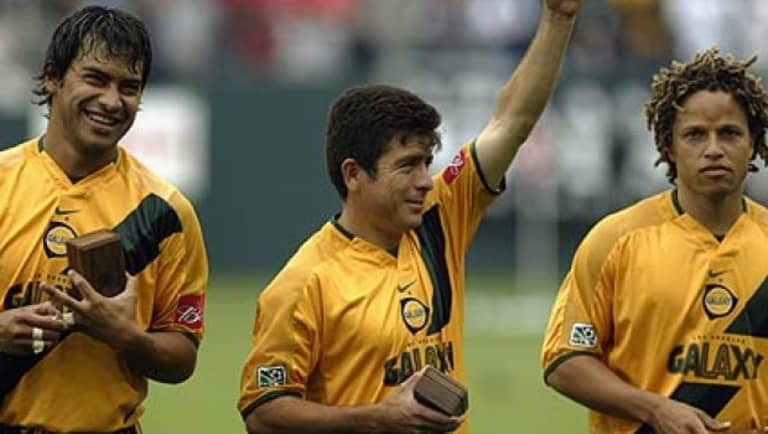
dlCatalogctl00lblImageCaption">dlCatalogctl00lblImageCaption">Mauricio Cienfuegos won two Supporters' Shields, an MLS Cup and a US Open Cup in his LA Galaxy career, while earning 68 caps and scoring 8 goals for El Salvador. He is now the coach of the Galaxy U-13s. (Photo by dlCatalogctl00lblImageCaption">dlCatalogctl00lblImageCaption">Getty Images)
*
The Galaxy want to put their players, no matter how young, under pressure, and they look to always compete in leagues with older players. That also includes moving individual players up into higher age groups at times. The U-14s, under Kleiban, are in U.S. Soccer's developmental league, and the U-12s and Mauricio Cienfuegos-guided U-13s play in the Southern California Developmental Soccer League.
“When our U-12s play, whoever they're playing, it's like a World Cup final [for the opponent], because it's the Galaxy,” Kirovski says. “Our kids at a young age are understanding what it's like to be a Galaxy player. They're under pressure every week. There's no weeks off, and that's important. I think that's a huge part.”
Teaching the kids how to win is part of the process, but winning isn't a primary goal.
“We very rarely talk about winning and losing at the younger ages,” Vagenas says. “Ideally, for us, the best thing would be for them to finish .500. I think there are fantastic teaching moments in losses as well as fantastic teaching moments in wins. If our younger kids are going 20-0 over a season, then they're not being challenged, and they need tougher competition. Which is why we have strategically placed our younger teams in older age groups and leagues, so they get that kind of competition. And are at least physically forced to play at a faster level.”
Advancing players up the ladder constitutes success, since getting players to the first team is the gauge for the academy as a whole. And the pivotal age, Vagenas says, is with the U-16 team, as players are transitioning from boys to men.
At these older ages, the teams are run similarly to the professional teams within the club, and the new Blended Learning Environment school, involving 55 players, enables the Galaxy to spend more time with their prospects.
“The school has transformed it,” Klein says. “Steven Gerrard spoke to our academy, and he said he used to have two hours a week to impress his coaches [at Liverpool FC]. That was the time he had to make an impact on his coaches. In our case, it was six or seven hours a week, and now that we have these kids in school, we can have an impact on them from 8 in the morning to 5 at night.
“And that does so much more than just the soccer side. It has to do with nutrition, it has to do with character, and it has to do with what they can do on the field. Having more time with these players is something that's vital, and in terms of the impact that we're having with them, it's up there with some of the biggest clubs in the world who have been doing this much longer than we have.”
The Galaxy understand that not every prospect is going to make the first team, that, Vagenas says, “as they get older, it becomes tougher and tougher, because it bottlenecks right before you get to the first team.”
“We understand that very few players will be able to progress into that last step,” Klein says. “Most important is we want to create players that are good in the classroom, who are good off the field, who are developing a character and a work ethic where they're going to be a success whether in our club or outside it ... where a kid can progress through our program and go to an Ivy League school.”
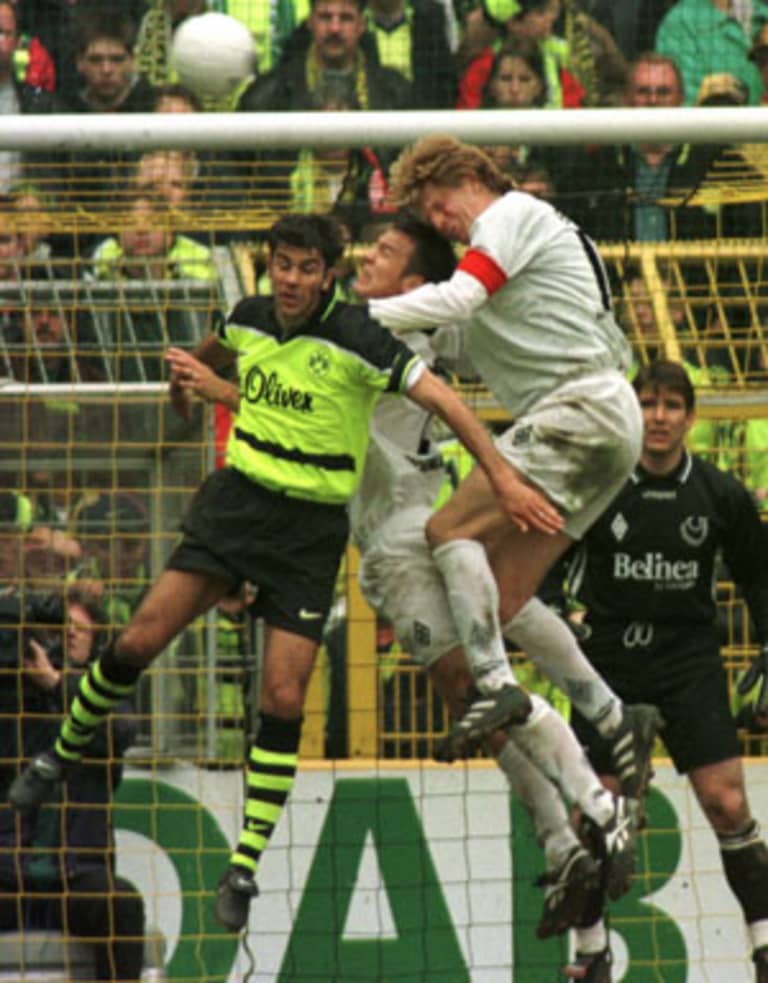
Galaxy technical director Jovan Kirovski in action with Borussia Dortmund. He remains the only American to have ever won the UEFA Champions League, claiming the title with Dortmund in 1997 (Photo courtesy of Action Images).
There are plenty of clubs that have influenced how the Galaxy maintain their academy. Kirovski, who played in Manchester United's academy, has visited Real Madrid, Paris St. Germain, Girondins Bordeaux and Valencia.
“Even from my Manchester United days, the discipline,” he says. “[Legendary manager Alex] Ferguson was about being humble, which is very crucial in development. I want to implement that here, and Pete understands that. He played at a very high level, and he gets that point. It's important we ingrain that in our culture.”
Muñoz, whose MLS career consists of one brief appearance each for the Galaxy and Chivas USA, has spent much of September starting an 18-month course through the French Football Federation's Centre National du Football in Clairefontaine, studying “how to teach the game.” As part of the course, he went to look into all aspects of the Spanish club Villarreal; his instructors will visit the Galaxy to analyze his work during the course.
“I don't ever want to come home from here,” Muñoz said from Spain, “but I'm dying to get back to my team. I'm not going to come back in and reinvent the wheel and change things, because I think what we do is similar to what these guys do. There are some little things I've picked up that I think could be beneficial to what we're trying to accomplish.
“Villarreal is more than just a soccer team [in its region]. And that's what we want to establish with our kids who come through our system. It's a lifestyle, and it's something that you want to be a part of for the rest of your life.”
What's next? What will it look like in another two or three years?
“I think two or three years might be a little early,” Klein says. “If you look five, 10, 25 years down the road, we're now seeing players that have progressed from the youngest ages of our academy up through our reserve team and into our first team. And I think only then will we see the real benefit of what this can do and what our ceiling is.
“We want to create world-class players that can compete with a player coming through Barcelona's academy or Manchester City's academy. And we believe we can do that. We have an owner [in Philip Anschutz] that's willing to invest in it, and we're committed to the cause. We're committed to the process.”

